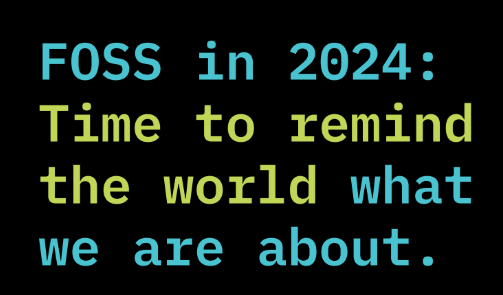By Janus Boye
Open Source technology, practices, and thinking have revolutionized how we innovate, collaborate, and do business. The impact goes beyond our daily work and paying our rent. Open source is everywhere; we won! But there's a downside.
The open source community has been so busy with our success that we have forgotten to tell people what makes us and Open Source different. We must remember how radical and important Open Source is. It is extraordinary that we build international communities of experts sharing our best ideas, building businesses, and creating value.
Open Source — and we — have the potential to create more positive change in the world. And we need to tell the world ... again. Right now, proprietary systems and vendors are winning pitches in government and elsewhere that should be no-brainers for Open Source solutions.
Jeffrey A. "jam" Mcguire in action at the Boye Aarhus 22 conference. He’ll be back in November for the Boye Aarhus 24 conference. Photo: Ib Sørensen
In a recent member's call, open source evangelists Jeffrey A. "jam" Mcguire and Mathias Bolt Lesniak reminded us about the open source value proposition, told us what comes next, and how to make sure we can continue to make a positive difference with Open Source in the future.
We started with a story from Australia and as Jam said, how we thought open source had already won.
Open source is freedom
In Australia the federal government shunned its own website content management system in favour of Adobe when myGov was redeveloped due to its “limited functionality”, only to leave Adobe’s content personalisation features unused, according to the review of the services platform.
Mathias Bolt Lesniak at the TYPO3 conference in Düsseldorf in October.
This case study of open source vs. proprietary software was publicised in early 2023 (Govt shunned own CMS for Adobe myGov features left idle) and is an example of how proprietary software can be procured based on big promises, but without the freedoms of open source.
Jam and Mathias reminded us of the four freedoms that comes with open source:
Use it: for anything, anywhere, forever
Study it: understand what you are using
Modify it: fix it, extend it, make it better
Share it: pass on, sell, share, give back
"Free as in beer" refers to something being available at no cost, while "free as in speech" refers to the freedom to use, modify, and distribute something without restriction. Open source comes with four freedoms!
Business and the Value Proposition
Reminding us that free and open source software (FOSS) is better, but not necessarily cheaper, Mathias and Jam used the below slide to show how the money spent on licence fees for proprietary software, instead can be put to good use by spending more on strategy, design, implementation and testing.
Another way of showing “Better, not cheaper” is the below side-by-side comparison.
Finally, we also heard the famous expression known from the restaurant business: “You gotta own the bricks”.
In the restaurant business, that means that if you are successful, the landlord will probably charge you more and more. When it comes to software, the value proposition for open source is that you don’t want to base your services on something that you have no control over, have to pay for over and over again, that others can arbitrarily turn off, change or charge more for?
Open Source Changes the World
Jam and Mathias opened this chapter by taking us to the UK and sharing the story of how not too long ago, the UK government relied mostly on proprietary vendors for their digital services. This was delivered by less than a handful of suppliers, mostly based in London.
Fast-forward to today, and the UK government digital services mandates open source, which has been the case for over a decade. This has also created a sprawling ecosystem of suppliers, who can deliver services and these are based all over the UK, including suppliers in Wales, Scotland and Northern Ireland.
We also heard a brief version of the TYPO3 success story in Rwanda. Since 2019, 250 Rwandan government websites have been planned, built, and launched using TYPO3. The benefits of open source are big and clear: It’s creating independent local businesses and expertise.
To quote from a slide where Jam and Mathias spelled it out:
“A democratic and not-for-profit open source project supports sustainable and independent local business”
What next?
Summarising the call, Jam and Mathias, shared how the values of open source are the values of a healthy society. With democratic values being under attack, they made the point that open source strengthens civil society everywhere. It not only improves civil society, it also improves business everywhere, as illustrated by the UK and Rwanda case studies.
In the closing Q&A, we also heard about how to figure out which open source projects to bet on and we covered how to avoid maintainer burnout.
Looking ahead, we also had a good and open-ended question on how to shift the perception that proprietary software is somehow a safer choice for large, complex and global enterprises. While open source today is a relatively easy sell for governments and non-profits alike, it’s still not the case for many industries, where they still look to analyst reports to find some commercial and proprietary ‘winner’. Here we still have work to do for free and open source software.
Learn more about free and open source software
We’ve covered open source for a while and here’s a few of our postings on the topic:
We’ve also looked closely at some of the prominent open source projects, including TYPO3, Umbraco and WordPress.
The conversation naturally continues in our peer groups and at our conferences. You can also meet Jam in person in November at the Boye Aarhus 24 conference.
You can also download the slides (PDF) or even lean back and enjoy the recording below.







